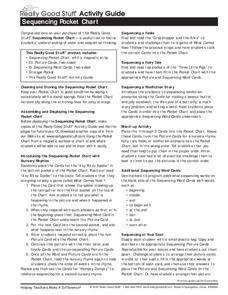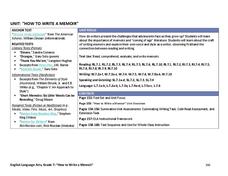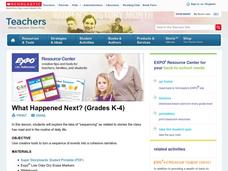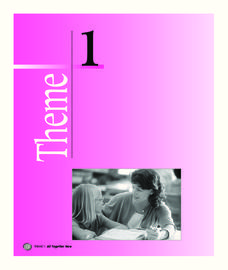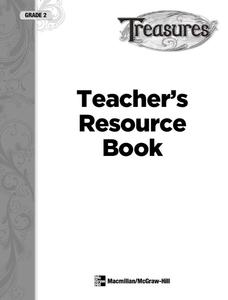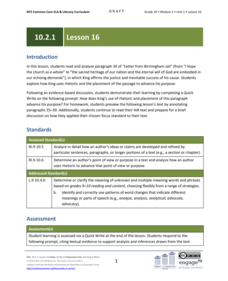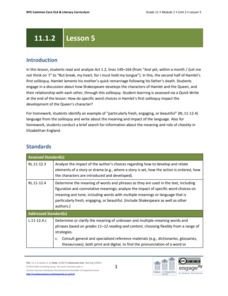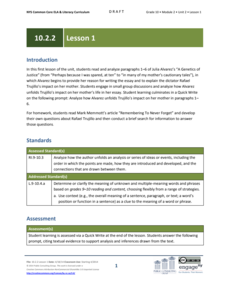Really Good Stuff
Sequencing Pocket Chart
Cut it out! Beginning readers practice sequencing skills at home or at school with a variety of activities that require cutting out multiple sets of picture cards and putting them in the correct order.
EngageNY
Our Group Readers Theater: Managing the Sequence of Events in Our Script
Go with the flow. Scholars learn how using transition words and phrases helps their scripts flow smoothly. Readers think about connecting each section after determining the sequence for their readers' theater manuscripts from To Kill A...
National Council of Teachers of English
Writing Acrostic Poems with Thematically Related Texts in the Content Areas
Scholars scour thematically aligned texts to gather a bank of words they can use in an original acrostic poem.
Louisiana Department of Education
How to Write a Memoir
Who are we and what shapes our identities? Seventh graders work to answer this question as they learn how to write a memoir. Full of non-print resources and supplemental texts that range from fiction to non-fiction, scholars write their...
Scholastic
What Happened Next? (Grades K-4)
Explore the structure of narrative writing with this fun, collaborative lesson. Start by reading aloud a short story, asking small groups of learners to fill in key events on a large story board prepared on the class whiteboard....
Curated OER
Nonfiction Genre Mini-Unit: Persuasive Writing
Should primary graders have their own computers? Should animals be kept in captivity? Young writers learn how to develop and support a claim in this short unit on persuasive writing.
EngageNY
Grade 10 ELA Module 2: Unit 1, Lesson 18
Examine how Martin Luther King Jr.'s final paragraphs of "Letter from Birmingham Jail" summarize the ideas throughout the piece. Readers discuss word usage and new vocabulary and complete guided questions to better understand how the...
Houghton Mifflin Harcourt
All Together Now: Extra Support Lessons (Theme 1)
All Together Now is the theme of this series of extra support lessons. The collection aids the instruction of blending sounds and reading high-frequency words through writing and reading sentences. Support also engages pupils...
Curriculum
Expository Writing
The beauty of the way this expository writing resource is structured is that the units can be presented as a complete writing workshop or sequenced throughout a course of study
EngageNY
Storyboard Revision: Managing the Sequence of Events and Using Sensory Details
Mastering techniques from the resource, pupils give life to their writing, revising their storyboards to include sensory details and transitions. To finish, they participate in a peer critique process and use the feedback to further...
EngageNY
Revisiting Big Metaphors and Themes: Revising and Beginning to Perform Two-Voice Poems
Now that your class has read all of Esperanza Rising, take the time to tackle big metaphors and themes. Pupils will participate in an activity called Chalk Talk, in which they circulate around the room in small groups and add...
McGraw Hill
Phonics Teachers Resource Book
Looking to improve your classes literacy program? Then look no further. This comprehensive collection of resources includes worksheets and activities covering everything from r-controlled vowels and consonant digraphs, to the...
EngageNY
Grade 10 ELA Module 2: Unit 1, Lesson 16
Take your place in the world—or the text. Scholars look at how the placement of a particular paragraph adds to the meaning of "Letter from Birmingham Jail" by Martin Luther King Jr. Before working on a quick write activity; readers...
Core Knowledge Foundation
Greek And Latin Root Words
Students examine Greek and Latin root words. They research the history of the English language, solve word games and puzzles, write paragraphs about the impact of Greek and Latin on the English language, and create flip chart study guides.
EngageNY
Grade 11 ELA Module 1: Unit 2, Lesson 5
Scholars delve into Act 1.2 of Shakespeare's Hamlet. By completing a writing exercise and participating in a class discussion, they continue to analyze how the author develops the characters in the play.
EngageNY
Grade 10 ELA Module 2: Unit 2, Lesson 1
Rafael Trujillo was president of the Dominican Republic in the 1930s. Pupils read and analyze the first six paragraphs of Julia Alvarez's autobiographical essay "A Genetics of Justice," in which the author describes Trujillo's impact on...
Curated OER
Whale Song Acrostic
What do whales sing about? Invite your class to imagine the thoughts of whales before writing acrostic poems on the topic. The plan blends together a bit of life science with plenty of opportunities for creativity and writing.
Curated OER
Fairy Tales
Once upon a time are four words most children are familiar with when reading a fairy tale. But do they know that fairy tales are a great way to learn the literary elements of reading and writing? Use a thorough fairy tale unit...
Virginia Department of Education
Developing an Essay: Word Choice
Grading essays after reading a novel written by a lyrical master (think Nabokov, Morrison, Chabon) is a deflating experience. Why can’t your student’s display the same skill in diction as your favorite writers? Because you did not use...
EngageNY
Grade 11 ELA Module 4 Overview
The intricate craft of narrative writing can make a happy story feel exuberant or a sad story feel devastating. With 42 extensive lessons that include poignant discussion questions, standards-aligned self-reflections, engaging writing...
Curated OER
Understanding and Using Root Words to Expand Vocabulary
Middle schoolers engage in a instructional activity which reminds them that root words indicate the base meaning of a word, and that those roots are found in many different words that have similar meanings. Pairs of pupils use...
EngageNY
Grade 10 ELA Module 3: Unit 1, Lesson 7
How did it happen? Scholars examine how the author describes the order of events in an excerpt from The Immortal Life of Henrietta Lacks. Learners use a Surfacing Issues Tool to guide their thoughts. Finally, they share ideas in pairs...
EngageNY
Grade 11 ELA Module 1: Unit 2, Lesson 11
What is Hamlet's attitude towards life and death in Shakespeare's Hamlet? Scholars continue reading the play to answer the question, paying particular attention to Hamlet's most famous soliloquy. By holding a discussion and completing...
Virginia Department of Education
The Writing Process for Expository Writing
Struggling on what steps to take in your expository essay lesson? Or confused on what to include for your scribes? This exercise in the process of expository writing provides concepts and structure for the educator on what the writers...
